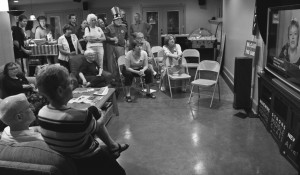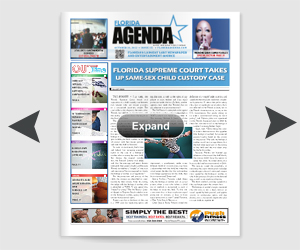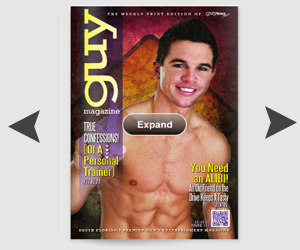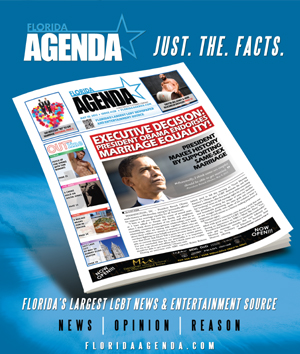By CLIFF DUNN

PHOTO: OFA - Obama For America
A movement is underway within the Democratic Party leadership to add language to the party’s platform, or statement of goals and principles, that gives full support to marriage equality. The proposed language would be included in the platform at this year’s Democratic National Convention, which will be held from Sept. 3 – 6 in Charlotte, North Carolina.
Every four years, both major political parties–and many smaller ones as well— issue a manifesto known as a “platform” that outlines a list of principles and actions which the organization supports as a means of appealing to the broader electorate. The platform is a statement of intent of what the party plans to accomplish legislatively and what social policies it proposes to support.
The platform is comprised of individual proposals and statements of principle and intent in support of (or opposition to) topics of political urgency, social relevance, and often controversy. Known as “planks,” they are named after the wooden slats that are assembled to construct a speaker’s platform.
Among the upper echelon of Democrats who have come out in support of a plank that espouses marriage equality is House Minority Leader Nancy Pelosi (D-California). The LGBT rights group Freedom to Marry has crafted language that proposes a reversal of the federal Defense of Marriage Act (DOMA), which bans federal recognition of same-sex marriage.
Last month the group, which was formed in 2003, launched its “Democrats: Say I Do” campaign, to gather signatures in support of the proposed plank. Thus far, about 30,000 people have signed the organization’s online petition to add marriage equality to the party platform.
Pelosi, who was the nation’s first female Speaker of the House of Representatives (2007-2011), is joined by U.S. Sen. Jeanne Shaheen (D-New Hampshire). Shaheen’s state is one of eight states to have legal-ized same-sex marriage. Former Sen. Russ Feingold of Wisconsin has likewise endorsed the Freedom to Marry proposal.
The language as it would appear in the party platform reads: “The Democratic Party supports the full inclusion of all families in the life of our nation, with equal respect, responsibility, and protection under the law, including the freedom to marry. Government has no business putting barriers in the path of people seeking to care for their family members, particularly in challenging economic times.
We support the Respect for Marriage Act and the overturning of the federal so-called ‘Defense of Marriage Act,’ and oppose discriminatory constitutional amendments and other attempts to deny the freedom to marry to loving and committed same-sex couples.”
Last week, the Washington Blade reported that 22 U.S. senators, including Barbara Boxer (D-CA), Dianne Feinstein (D-CA), Al Franken (D-MN), John Kerry (D-MA), Frank Lautenburg (D-NJ), Barbara Mikulski (D-MD), and Chuck Schumer (D-NY), had announced their support for the platform language.
“These 22 senators from across the nation all know firsthand why marriage matters to gay and lesbian couples, their kids, their kin, and our country,” said Evan Wolfson, president and founder of the New York-based advocacy group.
“Their support for Freedom to Marry’s ‘Say I Do’ campaign shows real momentum among Democrats for what the Democratic Party does at its best — overcome discrimination and barriers and lead the way toward a more perfect union. Freedom to Marry looks forward to working with these Democratic leaders, others joining the call, and those signing our online petition to put the Party and then America squarely on the side of liberty and justice for all.”
Supporters of the plank as well as those who urge caution about the timing of the language note the irony of North Carolina as the site of the 2012 Democratic National Convention.
In May, Tar Heel State voters will consider a proposed amendment to North Carolina’s constitution that would reaffirm the state’s ban on same-sex marriage, and which LGBT activists say would threaten all forms of domestic partnerships and civil unions for gay couples. Rights advocates have called the proposed Amendment One “draconian.”
“The proposed amendment to our state constitution is wrong on multiple levels. It denies equal rights under the law, a mainstay of America’s democracy since the beginning,” warned Cecil Bothwell, a Democratic candidate in the state’s Congressional primary.
“It is so poorly worded that it is likely to cause real harm to women, to unmarried couples with children, to seniors living together, in addition to its stated goal of preventing same-sex marriage,” added Bothwell, who is straight.
Voters in 30 states have approved bans on gay marriage, and a January survey by Raleigh-based Public Policy Polling found that 56 percent of North Carolina voters favor Amendment One. President Barack Obama has also muddied the political waters with his mixed signals on marriage equality.
In 2008, Obama—who is counting on North Carolina’s 15 electoral votes in November—announced that he supported civil unions for gays, but opposed marriage equality. He has since said, murkily, that his position is “evolving.”
And there are Democrats who support LGBT rights but are urging caution on this most sensitive of social issues. “I think the most important thing that we need to do at the convention is stay focused on jobs,” Maryland Gov. Martin O’Malley recently told the Huffington Post. O’Malley last week signed marriage equality into law in the Old Line State, but says he doesn’t want the party’s emphasis to shift from jobs and the economy to social issues, which could alienate independent voters.
“That’s what’s going to re-elect the president and hopefully elect more Democrats to Congress,” said O’Malley, who chairs the Democratic Governors Association.











